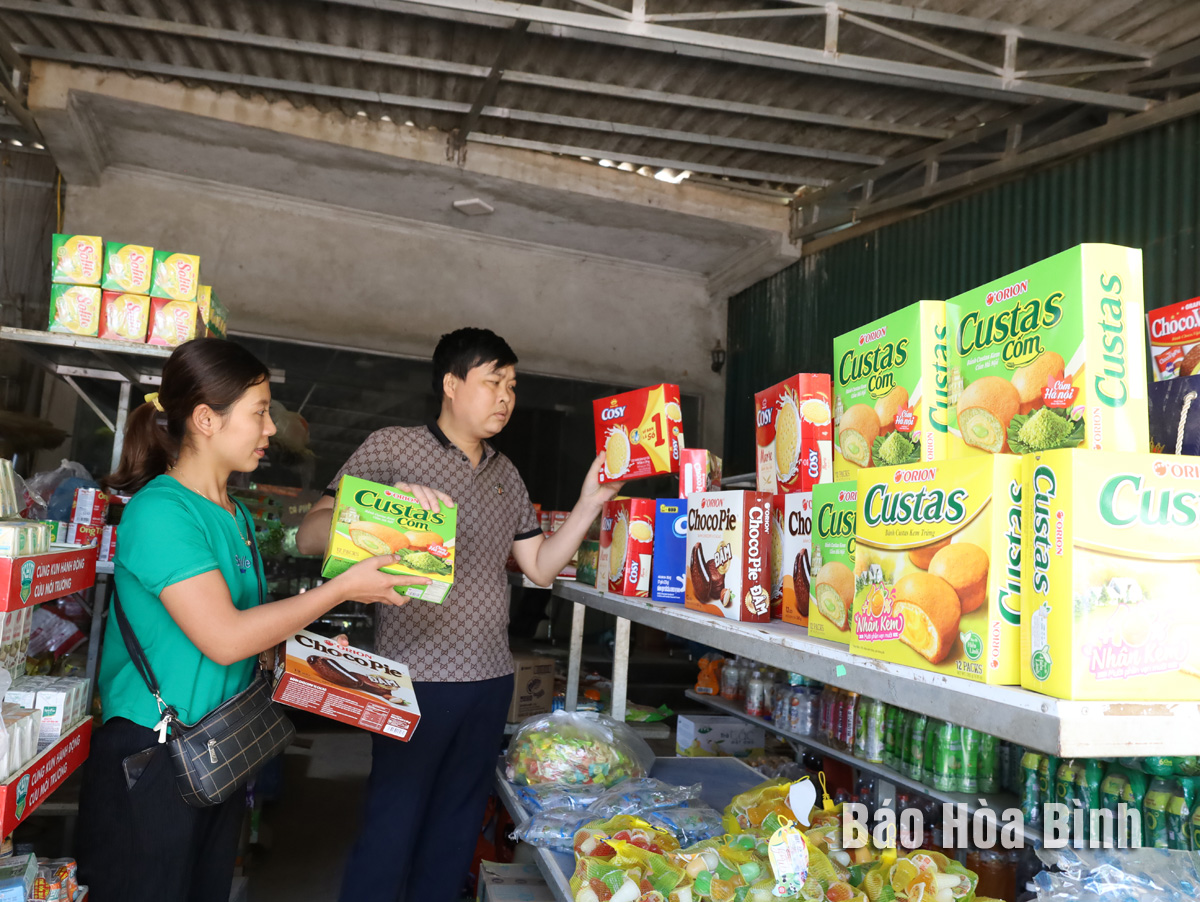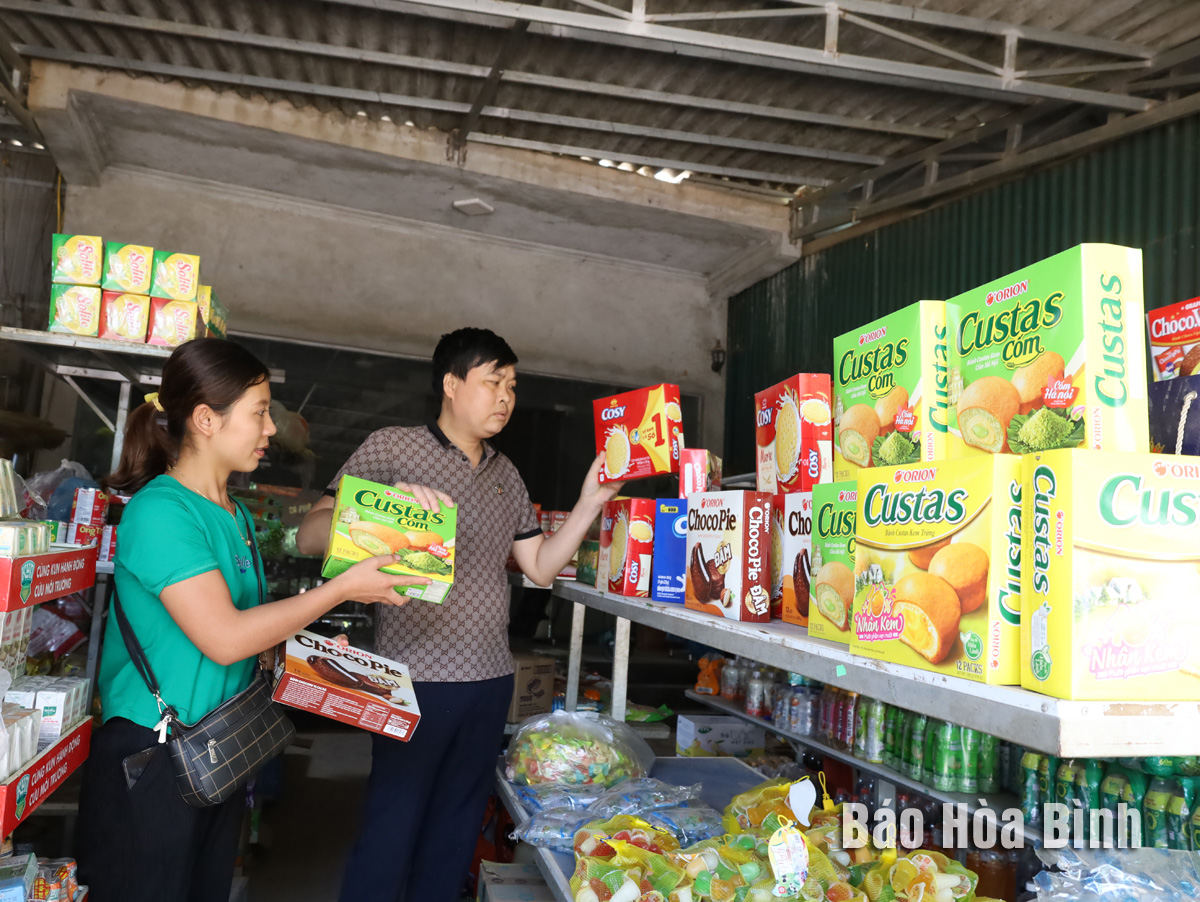
In the cause of sustainable poverty reduction, the State’s supporting policies are considered a powerful lever to help poor and near-poor households escape poverty in Hoa Binh province. Over the past years, the Party committee and authorities of Tan My commune (Lac Son district) have always paid attention to and focused on implementing sustainable poverty reduction. Their efforts have produced positive results.

Bui Van Dung in Tan My commune, Lac Son district, runs a grocery shop to help his family have a stable income.
Quach Van San, Vice Chairman of the commune People's Committee,
said that the communal People’s Committee has advised the local Party committee
to issue a resolution on poverty reduction, while including the work in
socio-economic development plans.
In 2023, Tan My commune has intensified the implementation of
the National Target Programme for Sustainable Poverty Reduction. In particular,
in order to support poor and near-poor households as well as those who newly
escape poverty in economic development, the commune has opened vocational
training classes for them.
The training courses are mostly short term, focusing on animal
husbandry, farming, agricultural machine repair, industrial sewing, among
others. Poor and near-poor households can also borrow loans from the Bank of
Social Policies for household economic development. They are also provided with
loans from the National Target Programme for socio-economic development in
ethnic minority and mountainous areas to buy water tanks to improve water
sources and environmental sanitation in daily life.
The locality’s economic structure has seen a strong shift.
Currently, about 1,500 labourers in the commune have joined the labour market.
Many have found jobs in industrial parks in nearby Bac Ninh and Bac Giang
provinces, while some others have returned to work at local electronics and
garment manufacturing enterprises.
In 2023, the agriculture - forestry sector make up 47% in the
commune's economy, industry - handicrafts - construction 27%, and trade -
services 26%.
Living condition of the locals have continued to improve, with
the average income per capita reaching 53 million VND (2,200 USD) a year. The
commune has 1,661 households with over 7,700 people. The poverty rate decreased
to 7.83% while near-poor households accounted for 6.86%.
According to data from the Hoa Binh Provincial Party Committee, the industrial production index for the first six months of 2025 is estimated to have increased by 20% compared to the same period last year. This marks the highest year-on-year growth rate for this period since 2020.
In the first six months of 2025, Hoa Binh province’s export turnover was estimated at 1.145 billion USD, marking an 18.11% increase compared to the same period in 2024. Import turnover was estimated at $ 804 million, a 17.15% increase, which helped the province maintain a positive trade balance.
The lives of the ethnic minority farmers in Tan Lac district have gradually improved thanks to the new directions in agricultural production. This is a testament to the collective strength fostered through the professional associations and groups implemented by various levels of the district’s Farmers’ Union.
With the motto the "product quality comes first,” after nearly one year of establishment and operation, Muong village’s Clean Food Agricultural and Commercial Cooperative, located in Cau Hamlet, Hung Son Commune (Kim Boi district), has launched reputable, high-quality agricultural products to the market that are well-received by consumers. The products such as Muong village’s pork sausage, salt-cured chicken, and salt-cured pork hocks have gradually carved out a place in the market and they are on the path to obtaining the OCOP certification.
In the past, the phrase "bumper harvest, rock-bottom prices" was a familiar refrain for Vietnamese farmers engaged in fragmented, small-scale agriculture. But today, a new spirit is emerging across rural areas of Hoa Binh province - one of collaboration, organisation, and collective economic models that provide a stable foundation for production.
Maintaining growing area codes and packing facility codes in accordance with regulations is a mandatory requirement for agricultural products to be eligible for export. Recently, the Department of Agriculture and Environment of Hoa Binh province has intensified technical supervision of designated farming areas and packing facilities to safeguard the "green passport" that enables its products to access international markets.



